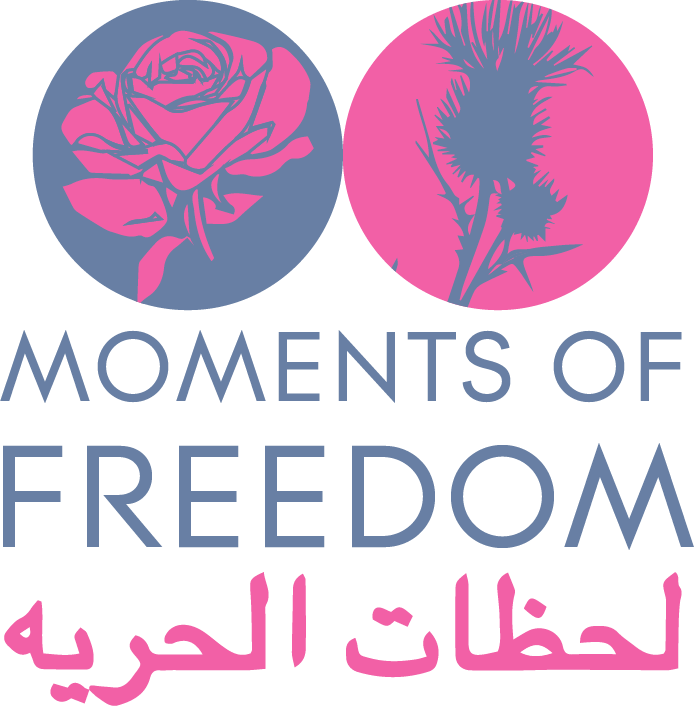Moments of Freedom, led by New Scot women resettled in Clydebank – is a safe space for women to come together to be themselves, make connections, share their skills and expertise to shape their local community for the meaningful integration of their families.
The name Moments of Freedom came from the women themselves- as a coveted moment where they feel free to be themselves without having to juggle all their other responsibilities. Together we have a clear vision of what meaningful integration means and a strong purpose of the steps we can take to collectively achieve it. As New Scot women we bring new perspectives, ideas and innovation as gifts to our communities in Scotland.
Our values
Our project values and supports the wellbeing of individuals and their communities.
We work with local associations and partnerships to make our work together sustainable.
Kindness- as a welcome to bring people together; all of our work is about manners and respect (both ways).
Giving time and space to learn from and about each other.
Human rights, equality and diversity are not concepts but are a part of everyday life.
Everyone’s contributions are valued and nourished across our community.
People feel safe and supported to share their experiences and skills.
قيمنا
يقدّر مشروعنا ويدعم رفاهية الأفراد ومجتمعاتهم. نحن نعمل مع الجمعيات والشراكات المحلية لجعل عملنا معًا مستدامًا. اللطف - كترحيب للجمع بين الناس ؛ كل عملنا يدور حول الأخلاق والاحترام (كلا الاتجاهين). إعطاء الوقت والمساحة للتعلم من وعن بعضنا البعض. حقوق الإنسان والمساواة والتنوع ليست مفاهيم ولكنها جزء من الحياة اليومية. يتم تقدير مساهمات الجميع وتغذيتها عبر مجتمعنا. يشعر الناس بالأمان والدعم لمشاركة خبراتهم ومهاراتهم.
Peer support
We use peer support to apply these values in the work we do. Our approach of embedding peer support at a community level cuts across all of the work we do because we know people are experts by experience. We develop our work from these points of expertise in communities to inform our networks and partnerships at local and national levels. Creating safe spaces to come together to encourage this type of support is what makes the most sustainable positive change to people’s lives.
How do we do this?
Relevant
We meet the group at times and in venues most suitable to them to introduce ourselves. People have a chance to get to know us so they are as comfortable as possible. We do this by facilitating activities that are non- threatening so groups can build a relationship with us and each other. We create a strong purpose led by the group to keep safe boundaries. We explain the project and why we want to meet people. We give people space to think about what they want to get from working with us. From what people tell us, we develop our work to be responsive to this so that we can support people to find solutions useful to them.
Welcoming and inclusive
Our work happens at times and places that works for the group. Our work is delivered at a pace that is comfortable for people and we offer a variety of ways the work can be delivered. We tailor the project to make them work for people with a range of different learning styles and personal circumstances. Our work with people is interactive so that people can learn from each other as well as the project and partnerships we bring. We are responsive to the groups voice to ensure the right supports are there at the right times such as when to have interpretation and who delivers this service.
Taking a human rights based approach.
We take steps to ensure people’s rights are at the centre of the approaches we take to inform policy and practice. This is transferred to the work we do with communities. In practice we take a PANEL approach.
Participation: We involve people in the decisions we make as a group, with the wider community and partnerships we work with.
Accountability: Our work with communities monitors how people’s rights are being affected in an everyday context and we create channels for actions and solutions when issues arise. We report on this via our funding networks and feedback to the group and the wider community.
Non-discrimination: All of our work is about ensuring people are treated fairly without discrimination, Syrian women in a new community often face the biggest barriers to realising their rights.
Empowerment: We create safe spaces for people to come together to lead their own agenda for self -empowerment. We fully support people to understand their rights in an everyday context so that they are real, in accessible language and encourage them to link these with relevant policy and practices that affect their lives.
Legality: All of our approaches are grounded in the legal rights set out in domestic and international laws.

